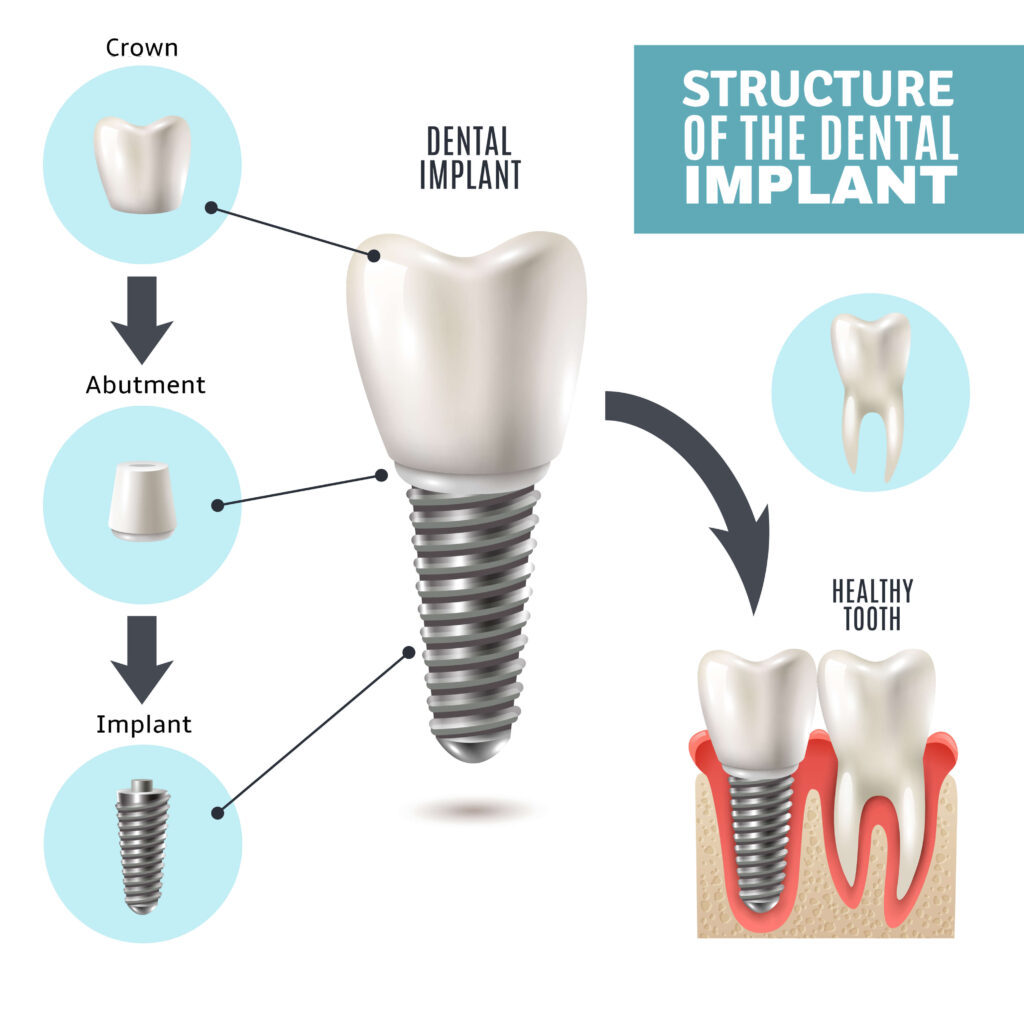After teeth that are lost or damaged, false teeth or artificial teeth can be used to replace them. No matter the reason for tooth loss, there are many different tooth replacement options: full dentures, partial dentures, fixed bridges, dental implants, and more. To find out which type of tooth replacement option is best for you, consult with your dentist so they can help you make an informed decision.

When a tooth is extracted or lost, the bone density in the jaw bone and the gums around it begin to shrink back or atrophy. Because of this, the size of the jaw bone creates a sunken appearance in the face and can make it challenging to fit dentures or other prosthetics as it changes. It can also make it hard to eat normally and speak correctly.
With dental implants, they can replace a single tooth or multiple teeth for a permanent solution to tooth loss. Dental implants are titanium screws surgically placed into the jaw bone, acting as artificial tooth roots. When the metal post (dental implant) is placed, the jaw bone will grow around it, keeping your gums healthy and acting as an anchor for your new replacement tooth. After the area where the dental implant is placed has healed, a permanent porcelain dental crown will be put in place. Porcelain crowns are used to restore a single lost tooth or multiple missing teeth that are not next to each other.
An advantage of dental implants over other replacement options is that they last longer and are easier to care for. Practicing good oral hygiene keeps your dental crown and dental implant in good shape, and patients who visit their dentists regularly for cleanings are less likely to develop gum disease and other oral health problems.

The same-day implant procedure is a minor surgery that allows a patient to walk out of the office with a temporary tooth on the same day as your dental implant placement. This is possible only if you have enough natural bone mass for an implant to support immediate placement and pressure of a temporary crown (temporary tooth). This procedure is perfect for patients who want to get back to smiling and eating normally as quickly as possible.
For patients who want a full set of natural-looking teeth, implant-supported dentures can provide an attractive, comfortable solution. With implant-supported fixed dentures, they can take the full force of a bite and absorb it through the implant into the jawbone, providing an effective and natural bite for patients. However, treatment tends to be more expensive since more implants are required, and mini dental implants may not be suitable for this type of denture. Implant-supported dentures work best for patients with high upper smiles because the replacement teeth can help hide where the denture meets the natural gum line.
Sometimes, the supporting bone is not in the right place for implant-supported dentures. Bone and soft tissue regeneration (bone graft) may be necessary before an implant-supported denture may be used. If this is true, an implant retained denture may be a more appealing option.
With implant-retained dentures, your gums will absorb more of your bite force than implant-supported dentures. Fewer dental implants will be required, making treatment less costly and providing an opportunity to use smaller dental implants such as mini dental implants. This type of treatment can be used where the bone is thicker and stronger, reducing or eliminating the need for bone grafts.
While this type of dentures can be used to restore a patient’s ability to talk confidently, eat comfortably, and are more comfortable than traditional dentures, they do not fully replicate all of the functions and structures of natural teeth. There is a chance that patients may experience sore spots because the denture will need to be relined periodically as the jawbone changes and soft tissues inside the mouth change. Like traditional dentures, they will also need to be removed each night for cleaning.
A dental bridge is a fixed restoration that replaces one or more missing teeth. A bridge uses a fake tooth that looks like a natural tooth and is custom-made for each patient. A benefit to a fixed bridge is it preserves your natural teeth and maintains an optimal shape for your facial structure. There are four types of bridges, traditional bridge, cantilever bridges, maryland bridges, and implant-supported bridges. A traditional bridge is the most common type of dental bridge and can be used when you have real teeth on both sides of the gap left by your missing tooth.
A full denture, more commonly referred to as a complete denture, is a set of artificial teeth and gums. A full denture is taken out at night or any other time during the day for cleaning and is made of resin or acrylic base. They are held in place with suction, and some patients sometimes find dental adhesives helpful in reducing slipping.
Dentures, over time, may become loose fitting as they need to be “re-fitted” as the natural mouth changes. This is called debasing and involves removing the existing teeth from the dentures and replacing them with a new set of plates that fits a little better.

Partial removable denture, also known as fixed partial denture, removable partial denture, or implant-supported bridge, comprises a series of fake teeth that fit your natural teeth and are connected with an acrylic or metal band. Sometimes called a Maryland bridge, this style of denture is held in place using resin cement or metal clasps. Similar to full dentures, partial dentures are removable dentures and can be easily removed for cleaning or be stored while you sleep.
Our teeth are made to last a lifetime, but unfortunately, this is not always the case. Tooth loss can occur in anyone, and some causes of tooth loss are out of your control. What is in control is with proper care and maintenance of your oral care. By maintaining good oral hygiene habits you can have a higher chance of having healthy teeth for many years. Here are some of the most common causes of tooth loss:
False teeth are not supposed to be distinguishable from the real thing, but some dentists and labs make them better than others. For example, when getting a dental crown or dentures, a dental lab technician will need to make it look like a natural tooth. Each technician has their method of making false teeth, so each set is slightly different. If the lab does a poor job, some will be able to tell that it’s fake. However, if the dentist creates a good impression (mold) for the lab to use and does quality work, it’s hard to tell the difference between natural and false teeth.
Many people experience tooth loss and need to replace missing teeth. If you’re missing teeth, you may experience discomfort, social anxiety, lack of confidence, and other issues that impact your quality of life. You may wonder what’s the best option available to replace missing teeth.
At Sloan Creek Dental in Fairview, we understand how important it is for you to feel comfortable and confident in your appearance, and replacing missing teeth can help do that and improve your oral health. There is no one size fit all approach as there are many factors in deciding which treatment plan works best for you. When you visit your dentist, your dentist can help walk you through the many tooth replacement options and work with you to find a solution that fits your situation best.

Contact Sloan Creek Dental for your initial consultation if you’re missing a tooth or multiple teeth, want to prevent bone loss following tooth extraction, or learn more about restorative dentistry. Our experienced dentist and team can help you navigate the process from beginning to end and go over treatment options available to you.
You can reach us at our Fairview, TX dental office to schedule an in-person consultation with us today – 972-468-1440. Our dental office is located in Fairview, Texas, and our patients visit us from across the surrounding areas, including Allen, Plano, McKinney, and Lucas.
We firmly believe that the internet should be available and accessible to anyone, and are committed to providing a website that is accessible to the widest possible audience, regardless of circumstance and ability.
To fulfill this, we aim to adhere as strictly as possible to the World Wide Web Consortium’s (W3C) Web Content Accessibility Guidelines 2.1 (WCAG 2.1) at the AA level. These guidelines explain how to make web content accessible to people with a wide array of disabilities. Complying with those guidelines helps us ensure that the website is accessible to all people: blind people, people with motor impairments, visual impairment, cognitive disabilities, and more.
This website utilizes various technologies that are meant to make it as accessible as possible at all times. We utilize an accessibility interface that allows persons with specific disabilities to adjust the website’s UI (user interface) and design it to their personal needs.
Additionally, the website utilizes an AI-based application that runs in the background and optimizes its accessibility level constantly. This application remediates the website’s HTML, adapts Its functionality and behavior for screen-readers used by the blind users, and for keyboard functions used by individuals with motor impairments.
If you’ve found a malfunction or have ideas for improvement, we’ll be happy to hear from you. You can reach out to the website’s operators by using the following email
Our website implements the ARIA attributes (Accessible Rich Internet Applications) technique, alongside various different behavioral changes, to ensure blind users visiting with screen-readers are able to read, comprehend, and enjoy the website’s functions. As soon as a user with a screen-reader enters your site, they immediately receive a prompt to enter the Screen-Reader Profile so they can browse and operate your site effectively. Here’s how our website covers some of the most important screen-reader requirements, alongside console screenshots of code examples:
Screen-reader optimization: we run a background process that learns the website’s components from top to bottom, to ensure ongoing compliance even when updating the website. In this process, we provide screen-readers with meaningful data using the ARIA set of attributes. For example, we provide accurate form labels; descriptions for actionable icons (social media icons, search icons, cart icons, etc.); validation guidance for form inputs; element roles such as buttons, menus, modal dialogues (popups), and others. Additionally, the background process scans all of the website’s images and provides an accurate and meaningful image-object-recognition-based description as an ALT (alternate text) tag for images that are not described. It will also extract texts that are embedded within the image, using an OCR (optical character recognition) technology. To turn on screen-reader adjustments at any time, users need only to press the Alt+1 keyboard combination. Screen-reader users also get automatic announcements to turn the Screen-reader mode on as soon as they enter the website.
These adjustments are compatible with all popular screen readers, including JAWS and NVDA.
Keyboard navigation optimization: The background process also adjusts the website’s HTML, and adds various behaviors using JavaScript code to make the website operable by the keyboard. This includes the ability to navigate the website using the Tab and Shift+Tab keys, operate dropdowns with the arrow keys, close them with Esc, trigger buttons and links using the Enter key, navigate between radio and checkbox elements using the arrow keys, and fill them in with the Spacebar or Enter key.Additionally, keyboard users will find quick-navigation and content-skip menus, available at any time by clicking Alt+1, or as the first elements of the site while navigating with the keyboard. The background process also handles triggered popups by moving the keyboard focus towards them as soon as they appear, and not allow the focus drift outside of it.
Users can also use shortcuts such as “M” (menus), “H” (headings), “F” (forms), “B” (buttons), and “G” (graphics) to jump to specific elements.
We aim to support the widest array of browsers and assistive technologies as possible, so our users can choose the best fitting tools for them, with as few limitations as possible. Therefore, we have worked very hard to be able to support all major systems that comprise over 95% of the user market share including Google Chrome, Mozilla Firefox, Apple Safari, Opera and Microsoft Edge, JAWS and NVDA (screen readers), both for Windows and for MAC users.
Despite our very best efforts to allow anybody to adjust the website to their needs, there may still be pages or sections that are not fully accessible, are in the process of becoming accessible, or are lacking an adequate technological solution to make them accessible. Still, we are continually improving our accessibility, adding, updating and improving its options and features, and developing and adopting new technologies. All this is meant to reach the optimal level of accessibility, following technological advancements. For any assistance, please reach out to